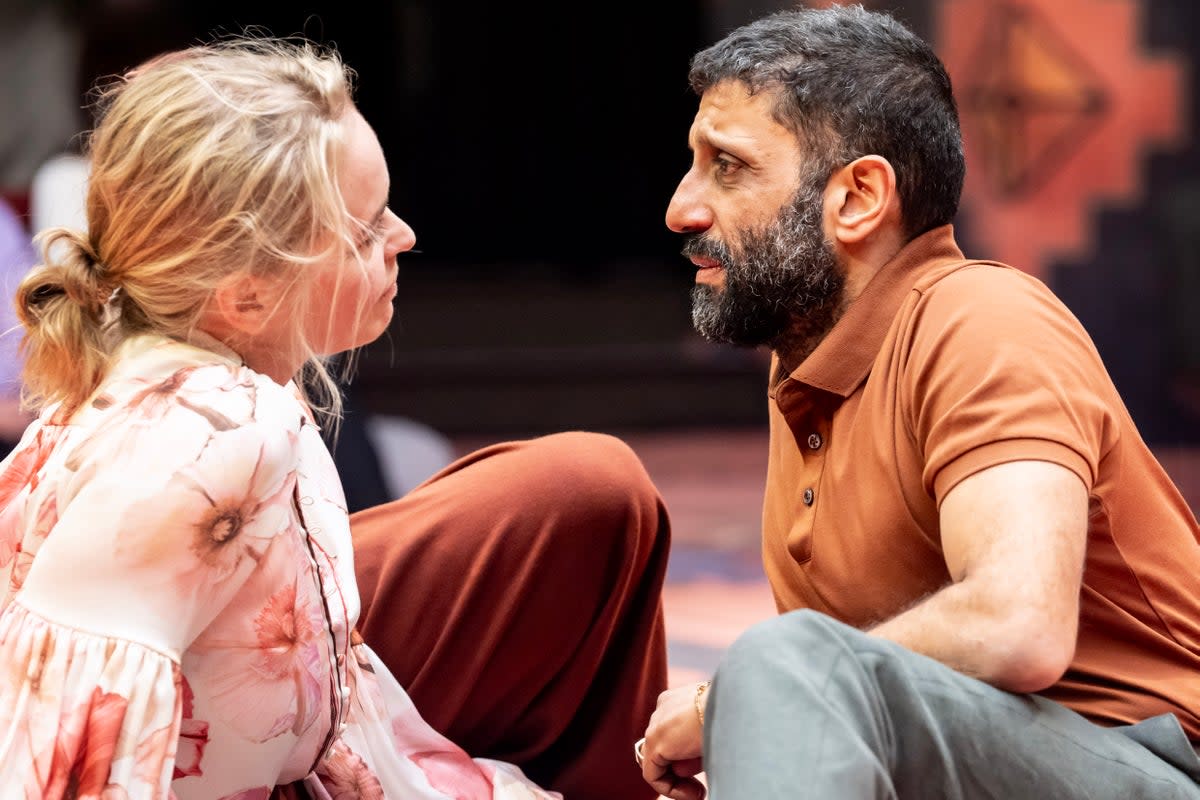The Cherry Orchard review: Chekhov characters banter and vape while the world burns

Has it started? The lights are still on, but there’s a woman wielding a Henry vacuum cleaner on a big rug, trying to avoid a prostrate man. Now there are actors popping out from the audience – have they been there the whole time? – bantering, drinking lager, vaping.
This isn’t what you’d expect from The Cherry Orchard. But it is the sort of thing you’d expect from director Benedict Andrews, who has a long history of making modern productions of classic texts, cutting those plays open and pulling out the heart. In 2014, Gillian Anderson was his Blanche in a revival of A Streetcar Named Desire, while Sienna Miller and Jack O’Connell starred in his woozy 2017 production of Cat on a Hot Tin Roof.
This is Andrews’ take on the story of an aristocratic family forced to sell off their land – including their beloved cherry orchard – and there’s a surprising amount of goofing around for both of them. Outrageous costumes too: statement pieces like a purple macrame cardigan and a t-shirt with what looks like a mole (possibly otter) wearing Groucho Marx specs and ’tache.
But the most obvious thing is the rug (Magda Willi’s design). It’s massive. All over the stage, covering the back wall, the coppery colour of dried blood or cherry stains. Actors lurch up from seats in the small auditorium and tumble around on it like it’s a toddler’s playroom. They talk disjointedly, confusingly, and there’s a lot of humour, which might have pleased Chekhov who always thought of this play as a comedy, though productions often lean towards elegy.
And what’s this all for? What’s the quick that Andrews is trying to cut to? Well, the main thing is decadence. He leans into the idea of a family completely impotent, or rather indolent, in the face of colossal change. When Chekhov wrote the play, the Russian Revolution followed a few years later. For Andrews’s version, set in the present day, that same impotence/indolence thing is there, but we’re talking climate change. The family’s refusal to acknowledge that they are about to be homeless, that the protections of money and class won’t matter, that their lives are about to change cataclysmically, is a small-scale playout of what we’re all going through. His production is all about the decadent moments before that precipice... and the horrific tumble after.
Clever, then, but also annoying. The first half feels really unsettled, unfocused too, and there’s an insistent quirkiness which grates. It’s like we’re sitting in on a rehearsal and the actors are doing funny exercises. Some bits seem improvised: “My bookcase!” Nina Hoss’s Ranevskaya exclaims as she clasps an audience member. Hoss is very good, especially in her more anguished moments, and there’s strong stuff too from Adeel Akhtar as upwardly mobile, never-quite-belongs Lopakhin, who wants to subdivide and sell the cherry orchard – “nine hundred thou a year, guaranteed”.
But in the second half, the cataclysm comes, and the humour goes away. First there’s a big party – a live band moved from the wings to centre stage – and then the orchard is sold. Suddenly, for a brief moment, the production comes together, a horror of screaming, blood, shock.

In fact, it’s a production that’s made by particular moments, rather than working as a whole: there’s the walk in the orchard where a little boy asks the family for a bit of change – they all jump back in horror – and then sings “Angel from Montgomery” in a beautiful treble voice. And there’s the sight of Ranevskaya wailing on the rug while Akhtar’s Lopakhin, blood pouring down his face, yells into a microphone.
If those brilliant moments were sustained, this would be an incredible production. But they’re not, and instead it’s alienating and a bit confusing. The way Andrews keeps pulling us toward the contemporary has worked in his previous shows. It gets us closer to the heart of the play. Here it gets in the way. He’s so focused on that one big theme of fiddling while the world burns that everything else – the minutiae of language, the depth of the characters, their relationships – is drowned out in the noise of the big statement.
Donmar Warehouse, until 22 June


